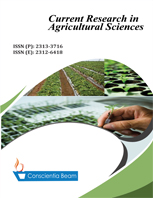Climate Change and Adaptation Strategies: Farmers Perception in Oyo State, Nigeria
DOI:
https://doi.org/10.18488/journal.68.2018.52.32.41Abstract
Climate change and weather variations have been one of the major problems of agricultural productivity most especially among crop farmers in Nigeria. This study therefore assesses farmer’s perception and their adaptation strategies to climate change in Ogo-Oluwa local Government area of Oyo State Nigeria. The survey research design was adopted in selecting 113 respondents, while the instrument of data collection was a structured questionnaire. The data collection was analyzed using both descriptive and inferential statistics. Results showed that the majority (65.5%) of the respondents were males while about 69% of them are between the ages of 31 to 50 years old, majorities (76.0%) of the respondents were married and average household size was 6.0 persons, family labour was the major source of labour for the respondents, 57.5 per cent and 32.7 per cent of the respondents had farm size of 3- 4 acres and above 4 acres respectively. It also shows that majority (51.3%) earned less than N10, 000 per month while 20.4 % and 21.2 % earns between N10, 000 - N20, 000 and N21, 000- N30, 000 per month respectively. The study reveals that 39.8% of the farmers had long years of farming experiences between 21-30 years. The study also reveals that the majority (81.0%) of the respondents are aware of the changing climatic conditions in their community. Educational qualification of respondents, farmers income, farming experiences and access to extension services are positively and significantly influenced farmer’s perception of climate change in the study area. Majority of the farmers have adapted to climate change through diversification of crop types and varieties, changing planting dates among others also constraints to adaptation of climate change include lack of access to weather forecast information, high cost of improved and resistant varieties, and inadequate knowledge of coping strategies. The study therefore recommends among others a deliberate policy of government to increase farmer’s access to weather forecast information in the study area.

